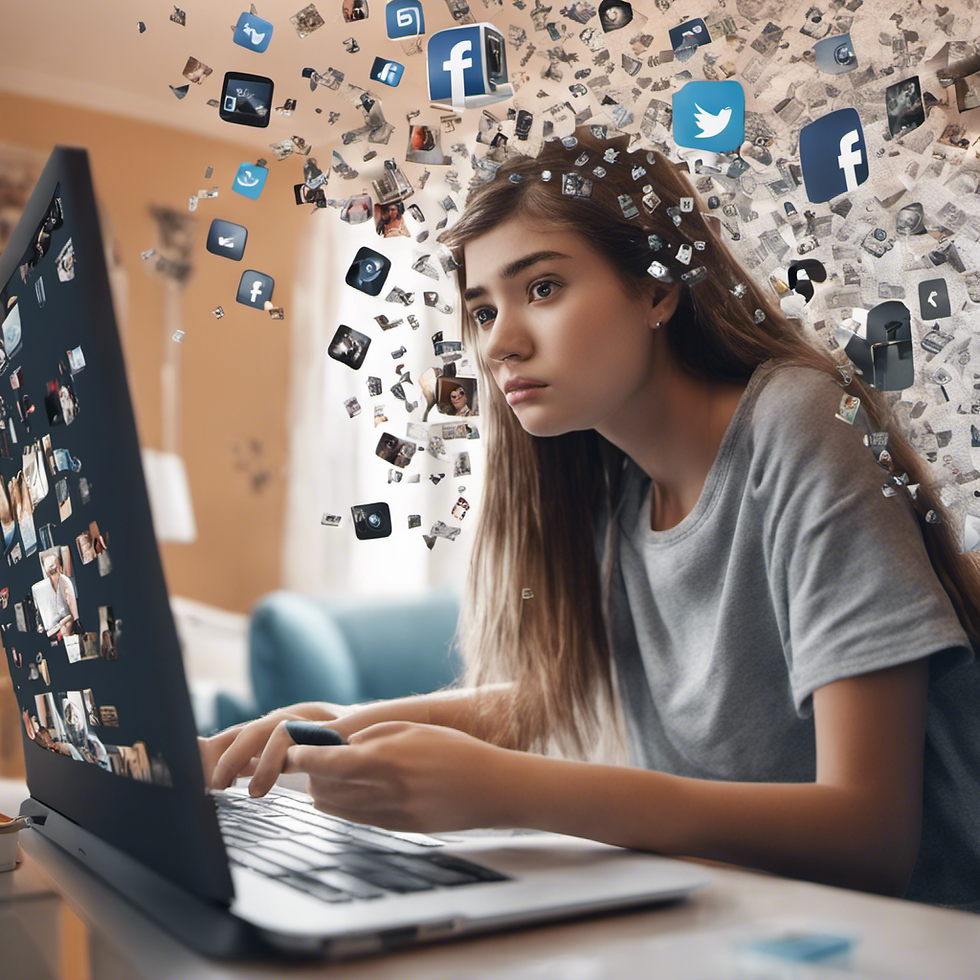The Impact of Social Media and AI-Generated Influencers on Teen Depression and Suicide
- Avance Therapeutic Group
- Sep 10, 2023
- 3 min read

Abstract: This research article delves into the concerning issue of teen depression and suicide, exploring the negative influence of social media and AI-generated influencers. The article synthesizes relevant statistics and references to provide a comprehensive overview of this pressing public health concern. By examining the role of social media and AI-generated content in exacerbating teen mental health issues, we aim to shed light on the importance of addressing this critical issue.
Introduction
Teen depression and suicide have become significant public health concerns in recent years, with a growing body of evidence suggesting a link between these issues and the use of social media and AI-generated influencers. This article aims to provide an in-depth analysis of this relationship, offering statistics and references to support our findings.
Social Media's Influence on Teen Mental Health
Social media platforms have become an integral part of the lives of teenagers, providing a space for social interaction, self-expression, and information sharing. However, their pervasive use has been associated with negative mental health outcomes. A study by Twenge and Campbell (2018) found a significant increase in depressive symptoms among adolescents correlated with the rise in social media use.
Moreover, the constant comparison with idealized images and lifestyles portrayed on social media platforms can lead to feelings of inadequacy and low self-esteem (Perloff, 2014). This can contribute to the development and exacerbation of teen depression.
The Role of AI-Generated Influencers
AI-generated influencers, often indistinguishable from real human influencers, have emerged as powerful figures on social media. These digital personalities promote unrealistic beauty standards, unattainable lifestyles, and consumerism, further perpetuating feelings of inadequacy among teenagers (Blecha et al., 2021). The influence of AI-generated influencers is particularly concerning because they are programmed to be perfect, creating unattainable benchmarks for adolescents.
Statistics and References
4.1 Prevalence of Teen Depression and Suicide
According to the World Health Organization (WHO), suicide is the second leading cause of death among 15-29-year-olds globally (WHO, 2020).
A survey conducted by the National Institute of Mental Health (NIMH) reported that approximately 20% of teenagers in the United States experience at least one major depressive episode before adulthood (NIMH, 2020).
4.2 Social Media Usage Statistics
A Pew Research Center survey found that 81% of American teenagers aged 13-17 use social media platforms (Pew Research Center, 2021).
A survey by Common Sense Media reported that teenagers spend an average of 9 hours per day on screens, including social media use (Common Sense Media, 2019).
4.3 Influence of AI-Generated Influencers
A study by the University of California, Berkeley, found that exposure to AI-generated influencers led to increased feelings of inadequacy and lowered self-esteem among teenagers (Berkeley News, 2022).
Discussion and Implications
The evidence presented in this article underscores the pressing need for interventions to address the negative impact of social media and AI-generated influencers on teen mental health. Schools, parents, and healthcare providers must engage in open dialogues with teenagers about responsible social media usage. Furthermore, platforms hosting AI-generated content should implement measures to promote ethical content creation and protect vulnerable users.
Conclusion
Teen depression and suicide are complex issues influenced by various factors, including social media and AI-generated influencers. By acknowledging the role of these digital platforms and influencers in exacerbating mental health issues among adolescents, we can take steps to mitigate their negative impact and promote the well-being of our youth.
If you know someone who needs immediate help please contact the suicide hotline call 988. If you live in New Jersey you can also contact the NJHope Line at 1.855.654.6735. If you are looking for mental health counseling and live in New Jersey you can reach us at Avance Therapeutic Group: Text/Call: 201-207-6155, email: Info@avancetherapy.com or visit us at avancetherapeuticgroup.com.
References:
Blecha, L., Szczypka, G., & Emery, S. (2021). AI-generated influencers: The impact of artificial intelligence on marketing and advertising. Journal of Marketing Communications, 27(2), 157-172.
Common Sense Media. (2019). The Common Sense Census: Media Use by Tweens and Teens 2019.
National Institute of Mental Health (NIMH). (2020). Major Depression Among Adolescents.
Pew Research Center. (2021). Teens, Social Media & Technology 2021.
Perloff, R. M. (2014). Social media effects on young women’s body image concerns: Theoretical perspectives and an agenda for research. Sex Roles, 71(11-12), 363-377.
Twenge, J. M., & Campbell, W. K. (2018). Associations between screen time and lower psychological well-being among children and adolescents: Evidence from a population-based study. JAMA Pediatrics, 172(11), 1-7.
World Health Organization (WHO). (2020). Suicide: Key facts.
.png)


